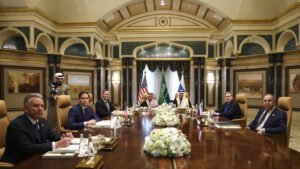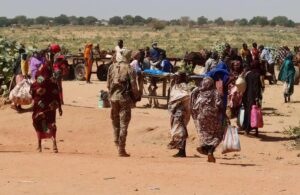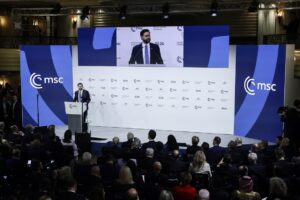
The National Interest Foundation Newsletter
Issue 274, February 21, 2025
Welcome to our NIF Newsletter. In this week’s edition, we analyze the U.S.-Russia talks in Saudi Arabia to discuss the Ukraine War without Kyiv, delve into the egregious human rights violations being committed by both sides during the ongoing civil war in Sudan, and examine the freedom of speech hypocrisy on display in U.S. Vice President JD Vance’s recent remarks in Munich.
Editor: Bassam Tarbush
U.S.-Russia Talks in Saudi Arabia to Discuss the Ukraine War Without Kyiv

The talks were held without the presence of Ukrainian or European officials. (Photo from AP)
Earlier this week, U.S. and Russian diplomats met in Saudi Arabia to begin discussions regarding putting an end to the war in Ukraine, as the talks were held without the involvement of either Ukrainian or European representatives. These are the first high-level talks between the United States and Russia since the latter’s invasion of Ukraine three years ago. To many observers, the absence of Ukrainian and European officials at the summit suggests an upending in U.S.-Ukrainian ties under Trump and that Kyiv will likely be pushed to cede territory to Russia in a potential peace agreement. Additionally, it also appears to signal a mutual interest among Trump and Russia to work towards improving relations. If so, this would mark a significant shift as the two countries had been drifting apart diplomatically in recent years. This divide had only grown after Russia’s illegal invasion of Ukraine in 2022, which prompted much of the international community to impose hefty sanctions on Russia in the hopes of isolating it on the global stage.
The announcement of the talks came the same day that U.S. Secretary of Defense Pete Hegseth had stated Ukraine would not likely become a member of the North Atlantic Treaty Organization (NATO), and that Ukraine should give up on winning all of its territory back from Russia. Hegseth’s words are in stark contrast to the previous Biden administration’s support for Ukraine to join NATO, and some have expressed a concern with the change in policy given the belief that Ukraine’s joining of the organization could serve as a huge deterrent for any possible future incursions into its territory. Also, various analysts contend that if the ongoing peace talks allow Russia to annex the land that it invaded, it would be a huge slap in the face to the concept of sovereignty and territorial integrity. Ukraine has a right to defend its internationally recognized borders from invasion, and the idea that Russia will potentially be allowed to hold on to the regions that it has occupied as it did with Crimea over a decade ago is alarming.
Notably, the talks in Riyadh this week proceeded without any Ukrainian or European representation at the table. Both parties were understandably distraught about the United States going over their heads to talk directly with Russia in a matter that relates to them as well. Trump administration officials have tried to appease things by stating that Ukraine and Europe will be part of any “real negotiations” to end the war, and have argued that the U.S. talks with Russia were merely a chance to see how serious Putin is about peace. Ukrainian President Zelenskyy said this past Saturday that the “decades of the old relationship between Europe and America are ending” and that those involved need to act accordingly. Any possible sidelining of Europe would be a noteworthy shift in foreign policy for the United States, but it is still unclear how recent developments will ultimately impact relations especially since all of this comes just days after Trump announced that tariffs on the European Union (EU) were imminent. For his part, Zelenskyy has called for fair peace talks that include more than just U.S. and Russian representatives, and has stated that no talks will be taken seriously unless Ukraine has a seat at the table. The Ukrainian president even postponed his trip to Saudi Arabia in light of the exclusive meeting. Ultimately, the Trump administration’s overture to Russian officials has raised eyebrows, particularly among European leaders who believe that Putin cannot be trusted. There is legitimate concern that a Ukraine deal without the involvement of Europe would leave the continent vulnerable to the prospect of further Putin aggression.
With respect to where the discussions were held, some commentators pointed out that Saudi Arabia was likely keen to host due to its desire to improve its standing with the international community and score a diplomatic win on the world stage, while aiming to cement its role as a key intermediary regarding the Ukraine War. In the aftermath of Saudi Arabia’s devastating and highly criticized intervention in Yemen and the brutal murder of journalist Jamal Khashoggi in recent years, Saudi officials have been attempting to rehabilitate their image. Thus, the hosting of these potentially groundbreaking talks on Ukraine seems to be a clear effort to try and win back some favor. The move comes following Saudi Arabia’s announcement of a $600 billion investment in the United States, and suggestions that the hosting might also be to better position Riyadh for future talks on post-war Gaza too.
In the preceding days, an evident rift has taken shape between U.S. President Trump and his Ukrainian counterpart Zelenskyy. In response to the U.S.-Russia talks without Kyiv and Trump’s comments blaming Ukraine for its ongoing conflict with Russia, Zelenskyy had stated that Trump was “living in a disinformation space” governed by Moscow. This then prompted Trump to call Zelenskyy a “dictator,” which elicited backlash from other European leaders.
Egregious Human Rights Violations Being Committed by Both Sides During the Ongoing Civil War in Sudan

The Sudanese civil war has resulted in one of the world’s most devastating humanitarian crises. (Photo from Reuters)
The calamitous ongoing civil war in Sudan, which broke out back in April of 2023, has seen both sides commit appalling human rights abuses. The now 22-month-long conflict between the Sudanese Armed Forces (SAF) and Rapid Support Forces (RSF) has not only been rampant with war crimes and serious human rights violations, but it has also brought about what many have deemed to be the world’s worst humanitarian and displacement crisis. More than 30 million people in Sudan – a whopping nearly 60% of the country’s total population – are in need of humanitarian assistance. Aid operations themselves have been severely hampered by the unstable and hazardous circumstances across the country, which has additionally led to the mass displacement of civilians fleeing their homes for safe havens. It is estimated that close to 9 million have been internally displaced within Sudan since the onset of the conflict, with a further 3 million escaping to neighboring countries. Sudan is also experiencing a major food insecurity crisis that has afflicted over half of its population.
The United Nations and various humanitarian organizations have documented the array of gross human rights violations committed by both the SAF and RSF. Reports detail numerous indiscriminate attacks in densely-populated areas that have often times even included sites sheltering displaced civilians, hospitals, and schools. Independently gathered evidence in the form of videos, photographs, and satellite imagery has demonstrated the use of explosive weapons in these attacks as well. A few months ago, the ‘United Nations Independent International Fact-Finding Mission for Sudan’ outlined widespread human rights abuses and war crimes that extend far beyond indiscriminate attacks. The SAF and RSF have also regularly engaged in arbitrary detainment, sexual violence, obstruction of humanitarian access, pillaging, destruction of property, persecution and violence on the basis of ethnicity, and torture. All of this has prompted rights groups to warn that a sense of “entrenched impunity” is fueling the grave human rights violations and abuses that are plaguing Sudan. As such, many are calling for a comprehensive global effort to ensure accountability and curtail the flow of weapons to the country’s warring parties.
While the current conflict in Sudan erupted back in April of 2023, several notable developments took place between 2019 and 2023 that preceded the outbreak of fighting which has continued until today. In April of 2019, longtime despot Omar al-Bashir was ousted from power in a military coup following large-scale popular protests demanding his removal. A few months later in August, Sudan’s main opposition coalition and the ruling military council signed a power-sharing agreement to rule as a transitional government for a period of three years’ time, paving the way for future elections and civilian-led government. However, in October of 2021, the Sudanese military took control of the country’s government, derailing the transitional process and ultimately creating the political climate which descended into the outbreak of fighting in 2023 between rival armed factions, the SAF and the RSF.
Over the past week, the SAF has retaken large segments of the capital city of Khartoum and the surrounding areas from the RSF, while the latter has been lambasted for carrying out a multiple-day assault that killed hundreds in villages near the town of El Geteina. As a result of them losing ground to the SAF in Khartoum, the RSF are believed to be trying to tighten their grip on strongholds that they have retained in places like Darfur and other parts of western Sudan. The SAF’s regaining of territory has cut crucial supply routes for the RSF. Amid the intense fighting, civilians are caught in the middle, often unable to escape or even killed when trying to do so. Those who are fortunate enough to survive can be subjected to targeting at the hands of the SAF and RSF if either perceives that they are potential sympathizers or spies for the other side. In fact, according to local human rights monitoring groups, hundreds of people have been killed based on the suspicion that they supported one of the warring factions due solely to their ethnic backgrounds.
Both of Sudan’s warring parties have been condemned for their major human rights violations, and the United States has imposed sanctions on the leaders of the two factions. In early January of this year, the outgoing Biden administration accused the paramilitary RSF of engaging in systematic atrocities against the Sudanese people and sanctioned its leader, Mohamed Hamdan Dagalo. About a week later in mid-January, the U.S. also imposed sanctions on the head of the SAF, Abdel Fattah al-Burhan, expressing that the army under his command had committed lethal attacks on civilians and was responsible for the routine denial of humanitarian access.
JD Vance’s Remarks in Munich Put Freedom of Speech Hypocrisy on Display

Vance’s speech at the Munich Security Conference elicited criticism for its hypocrisy and inaccuracies. (Photo from EPA)
Last Friday, U.S. Vice President JD Vance delivered remarks at the 61st Munich Security Conference (MSC 2025) – an annual gathering on international security policy held in the German city. The address was decried by many, including the European Union (EU), Germany, various American elected officials, and political commentators. Vance was criticized for the blatant hypocrisy of his remarks. Observers were quick to point out that while Vance attempted to lecture European governments on the need to respect election results and not censor free speech, he himself has repeatedly refused to acknowledge that Donald Trump lost the 2020 U.S. presidential election and has taken part in efforts to muzzle freedom of speech within the United States. The U.S. vice president chastised entities in Europe for, in his eyes, “rejecting freedom and liberty” and failing to protect citizens’ rights to express views that others may not agree with, yet his own administration has not lived up to those same standards. Thus, as one critic highlighted, Vance was a “poor messenger” regarding the issues that he delved into.
In regards to freedom of speech protections in particular, Vance reprimanded European leaders on the subject despite the fact that the Trump administration has initiated efforts aimed at suppressing this. Back in late January, Trump signed an executive order targeting university students who participate in protests or other forms of freedom of speech expression that is critical of the Israeli government’s war crimes and human rights violations. While many of these individuals are simply seeking to draw attention to the issue, call for accountability, and urge that the United States and other global actors not be complicit in these abuses, the Trump administration’s move would instead demonize individuals who are conveying legitimate concerns with U.S. policy towards Israel and doing so in a manner that aligns with freedom of speech protections granted under the First Amendment of the U.S. Constitution. As such, the Trump executive order – like other executive actions that the president has rushed to sign during the first days of his second term in office – is expected to face legal challenges and has been criticized by legal scholars and experts.
While he was largely expected to discuss security-related issues pertaining to the Ukraine War, U.S. Vice President Vance ended up giving a belligerent speech scolding European officials for their perceived failures and shortcomings. He stated that rather than concern themselves with “external threats” such as Russia or China, Europe should worry about “the threat from within,” a “retreat from some of its most fundamental values,” and its heavy “silencing of voices.” Vance accused EU commissars of shutting down social media during times of civil unrest and suppressing what they deem to be “hateful content,” when in actuality, there is due process required in order to do this under the Digital Services Act (DSA). In these cases, a judge has to determine that the evidence of criminal offenses provided cause a threat to people’s life or safety, and only under those circumstances can any moderation be enforced in the online presence of an individual on a platform or search engine. Vance also remarked on German police raids against citizens suspected of posting hateful misogynistic comments online, including ones advocating for rape and sexual assault, but the fact of the matter is that these resulted in interrogations but no arrests.
One of the most hypocritical elements of Vance’s speech was his criticism of the Romanian government’s annulment of an election, something he referred to as undemocratic and shocking, despite his own refusal to unequivocally acknowledge the outcome of the 2020 U.S. presidential election and the unquestioned fairness of the American electoral system and process. The failure of Trump and many of his surrogates to assuredly accept Former President Biden’s fair triumph in the 2020 election ultimately sparked the January 6th insurrection in 2021, and therefore, Vance should be mindful and introspective of his own administration’s actions first before speaking on the perceived undemocratic actions of other countries. In fact, Trump drew criticism the day after Vance’s speech for stating on X that “He who saves his Country does not violate any Law.” The insinuation that anyone is above the law is dangerous and wrong, and is the kind of thing that should really warrant rebuke for being incompatible with a free and fair society.
